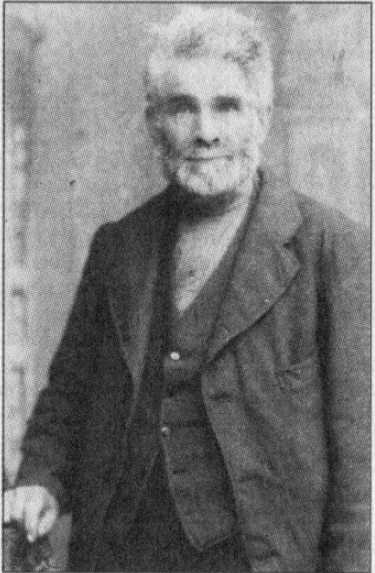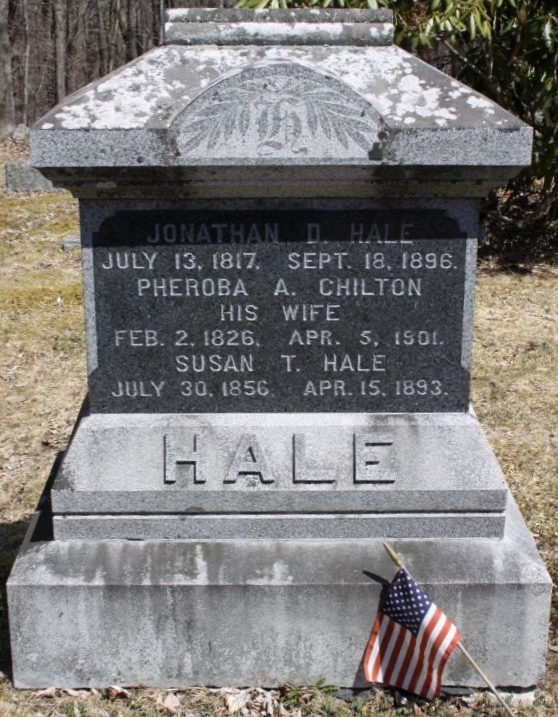Jonathan Hale’s Union Support Led Him To Flee Upper Cumberland
by Dr. Calvin Dickinson & Charlene McClain

Jonathan Hale (1817-1896), born in Stoddard, Massachusetts (sic), studied medicine in Pennsylvania, according to family tradition. It is unknown if he actually attended a medical school, if he studied under a physician, or if he was self-taught. He taught at Centre College in Danville, Ky., for about 18 months, and he possibly studied with a doctor while living there. In 1850, the census listed him as a physician in Fentress County, Tennessee, and one account book indicates that he did practice medicine in the state.
How, why, and exactly when he came to Tennessee is unknown, but records indicate that he was a resident of the state in 1844. He met his wife, Pheroba Chilton (1826-1905), in Tennessee, and the couple produced seven children. A man of many interest and talents, Hale operated a 100 acre farm on the Wolf River near Byrdstown, in what was at that time Overton County (later Pickett County). He operated a manufacturing facility on his farm, producing wagons and furniture. In 1860, he owned five slaves.
In October of 1845, Hale and John F. Jouett petitioned the General Assembly for permission to establish a grist and saw mill on the river. Thirty-eight men endorsed the petition, and the government approved the request. A witness later testified that the mill was “very large, 28 x 50, two stories high.” In addition to operating the mill, Hale and his partner operated a general store. In 1851, Hale was appointed postmaster for the area. He was described by a contemporary as “five feet nine inches high; has sandy hair and whiskers, rather stooped or round shoulders, and a gray eye. He has a long and rather narrow head, and is heavy built; is quite energetic and industrious.”
When the war started in 1861, Hale and his family declared for the Union. “He was among the first to denounce and expose session.” On July4, 1861, a large group of men, women, and children gathered at Hale’s mill to celebrate the birthday of the United States. The Union flag was raised on a pole and Mrs. Hale read the Declaration of Independence. Two of Dr. Hale’s daughters sang The Star-Spangled Banner. The Cookeville Times reported that Hale was making up a Lincoln company.”
These expressions of loyalty to the United States infuriated Confederate sympathizers, and the Hale family fled to Kentucky for safety. A contemporary reported that “at the hour of midnight he loaded his wagons with a portion of his personal effects, and, with his family, made his escape to Albany.” The U. S. Army appointed Hale a captain and Chief of Scouts of the Army of the Cumberlands. In this capacity he served under General George Thomas. Hale reported on the activities of Confederate leaders Morgan, Forrest, and Wheeler. He also recruited men in Tennessee for the Union army. One witness testified that “a great many men went union that would not if (it) had not been for him.”
A detachment of Champ Ferguson’s Confederate guerrillas, coming out of Kentucky, burned Hale’s property in 1862. The band consisted of “Rebel citizens, thieves, robbers, murderers. A few Rebel Soldiers were with them, not many.” A hearing in 1864 indicated that about $20,000 worth of buildings and materials were destroyed. (One property destroyed was $40,000.) Listed in the destruction were Hale’s home and two other houses, a large library in Hale’s house, “negro cabins,” a barn, stable, store, still
house, kitchen, grist and saw mill, 1000 bushels of corn, planning machine, mortising machine, running lathe, circular saws, tolls, lumber, wagons, and furniture.
“When they burned his property they stated that it was because he was a D… ..d Yankee.” Ferguson carried off Hale’s piano by ox team and wagon and later sold it in Yankeetown for about $200. Hale said that “he had suffered much, and could endure more; that he would never desert the Union.” In 1864 a military commission in Nashville awarded Hale $25,000 in a assessment levied against those accused of burning his property. There
is no evidence that he actually collected the money.
In July of 1865 a group gathered at his home to celebrate the Union victory and “hoisted the Old Flag.” The attendants fired a 34 gun salute, and Hale’s daughters again sang the Star Spangled Banner. Hale read the Declaration of Independence.
After the war, Hale acted as a recruiter for witnesses against Champ Ferguson, and both Hale and his wife testified at the trial. Ferguson referred to Hale during the trial as a “mean low flung dog.” Due to his wartime activities and his involvement in Ferguson’s trial, Hale received threats from Confederate sympathizers and the KKK.
In 1868 a letter appraised Hale: “This is to notify you that the Spirit of Champ Ferguson still lives, and there are men living that are determined to avenge his death – and you are also aware that your oppressive and wicked acts toward the best citizens of Overton County stand recorded against you … Prepare to meet your God.” The next year Hale and his son were attacked by the Klan. They escaped death by leaping from windows and fleeing before a torrent of bullets.
Due to this harassment, by 1871 Hale and his family left Tennessee and returned to New Hampshire. In retirement he wrote at least nine booklets, mostly about the war. In 1896 Hale died of “old age.” The death certificate listed him as “Farmer.”
In 2011 Tennessee erected a historical marker on Highway 111 in Pickett County honoring Dr. Hale. In 2013 the Huntington Library in California acquired a collection of about 1500 pages of writings by and about Hale and his wife. The spouses both wrote extensive diaries, and the collection also contains notebooks, correspondence, eyewitness testimonies, and published pamphlets written by Hale.
Hale Family Tombstone

Jonathan Davis Hale
b. 13 July 1817, Stoddard, NH
d. 18 September 1896, Stoddard, NH
Wife: Pheroba A. Chilton (18261905)
Father: Obed Hale
Mother: Nancy Davis
Buried: New Town Cemetery, Stoddard, Cheshire Co., NH
Pheroba A. (Chilton) Hale
b. 2 February 1826, TN
d. 5 April 1901, Stoddard, Cheshire Co., NH
Husband: Jonathan Davis Hale (18171896)
Father: William Chilton
Mother: Sarah Winefred Hughlett
Buried: New Town Cemetery, Stoddard, Cheshire Co., NH
Susan T. Hale
b. 30 July 1856, TN
d. 15 April 1893, Stoddard, NH
Father: Jonathan Davis Hale (18171896)
Mother: Pheroba Ann Chilton (18261905)
Buried; New Town Cemetery, Stoddard, Cheshire Co., NH
Source: The Herald Citizen, Cookeville, TN – Sunday, 4 May 2014, page C3 – “Cumberland Tales”
The source of the foregoing text is a document sdubmitted to the Pickett County Historical & Genealogical Society Facebook Group by Ronald Dishman in July, 2020.
Original source — http://www.ajlambert.com/history/ct_hus.pdf
You can view the article in PDF format below.
Jonathan Hale's Union Support, Fled Upper Cumberland - Newspaper Article